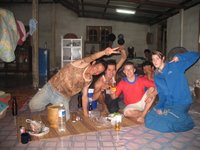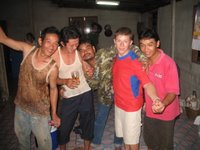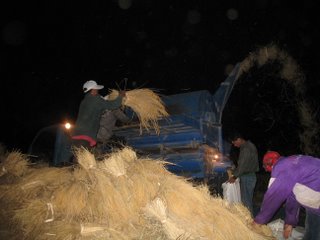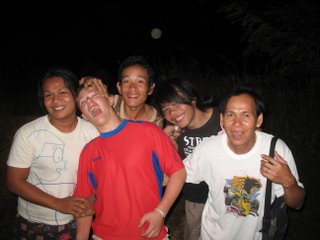Saturday was the first semi-annual Isaan Community Gathering. In about 15 days, we put together a festival outside the CIEE office and invited all the communities we had worked with throughout the semester. At least 500 people must have been there, and there were a ton of vendors selling handmade clothes, kids selling organic fertilizer that they made at school, lots of games, legions of food, and several exchanges among the communities in the Northeast. The people affected by dams, mining, etc. that we had lived with this semester exchanged for about 5 hours about wawys they could fight for their human rights collectively, esp. by using the International Covenant on Economic, Social, and Cultural Rights. They've decided not to wait for the next festival to keep talking, so the anti-mining group in the North is going to travel to central Isaan to network with the HIV/AIDS group in central Isaan, and the rice farmers in Surin will meet with the villagers in the Southeast who were displaced by large dams. They're talking about building a new people's network and writing a set of people's law to oppose the post-coup military-directed constitution in the works right now.
There was an exchange about alternative education among the Thai Seeka Association (the group I was interning with this semester), the assistant to the mayor, and local schools, sharing ideas about locally-based curriculum-building that empowers kids with the skills to organize together and make good things happen in their own communities. They ran way overtime, too.
There was an exchange with some of the CIEE students and some students from Khon Kaen University, trying to extablish some first contacts so that we can work with their clubs and talk about what education should be based on their experiences. It was pretty low-key, but some of the KKU kids are incredible, and we hadn't had a chance to meet them all semester. I bought a shirt from a girl named pui--it's from a group she's in called We Change. On the back, it has a list of things in Thai that I spent a half hour trying to read, things like 'we don't go to 7-11' and 'we don't use styrofoam' or watch TV; to 'we question the rules of the Thai government' and 'we don't stand up straight during the national anthem'; to 'we think about not just ourselves but other people and the environment' and 'we think about our dreams for the world', and everyday we make that change within ourselves, and by doing so, we change the world.
And that's it! Program's done, I'll be on a bus tonight to Chiang Mai to stay at an elephant rescue park for 3 days, then I'll be back in Khon Kaen for a few before I stay with Paul in Bangkok on my way to the airport!
There was an exchange about alternative education among the Thai Seeka Association (the group I was interning with this semester), the assistant to the mayor, and local schools, sharing ideas about locally-based curriculum-building that empowers kids with the skills to organize together and make good things happen in their own communities. They ran way overtime, too.
There was an exchange with some of the CIEE students and some students from Khon Kaen University, trying to extablish some first contacts so that we can work with their clubs and talk about what education should be based on their experiences. It was pretty low-key, but some of the KKU kids are incredible, and we hadn't had a chance to meet them all semester. I bought a shirt from a girl named pui--it's from a group she's in called We Change. On the back, it has a list of things in Thai that I spent a half hour trying to read, things like 'we don't go to 7-11' and 'we don't use styrofoam' or watch TV; to 'we question the rules of the Thai government' and 'we don't stand up straight during the national anthem'; to 'we think about not just ourselves but other people and the environment' and 'we think about our dreams for the world', and everyday we make that change within ourselves, and by doing so, we change the world.
And that's it! Program's done, I'll be on a bus tonight to Chiang Mai to stay at an elephant rescue park for 3 days, then I'll be back in Khon Kaen for a few before I stay with Paul in Bangkok on my way to the airport!





